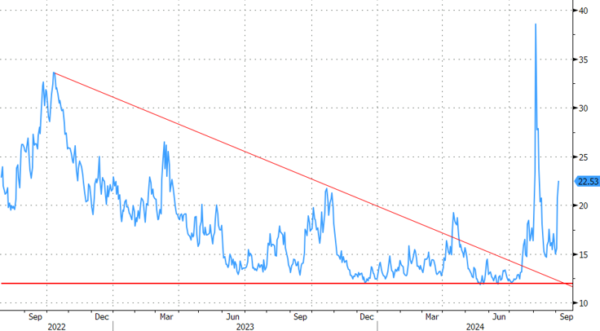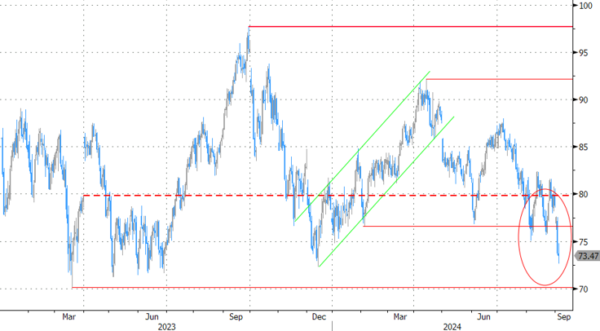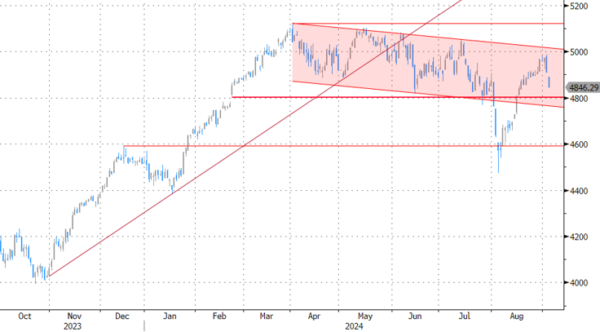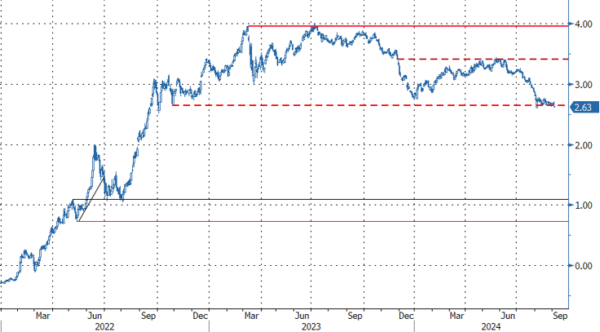Markets
Equities continue to take center stage on markets. European stocks underperformed in a catch-up move with the US. The EuroStoxx50 loses another 1.2%. Wall Street was granted some relief after yesterday’s violent sell-off with stocks trading currently only marginally lower (Nasdaq -0.3%). Tuesday’s sell-off took place against the backdrop of lofty (tech) valuations & a weaker than expected manufacturing ISM that reignited growth fears ahead of other important data releases this week. The US JOLTS job openings scheduled for release after wrapping up this report could add to that sentiment should they disappoint. The Fed’s Beige Book is to be published a bit later and kicks off the September monetary policy cycle. That Sep 18 meeting is growing into a very important one with a string of weaker (?) labour market data potentially paving the way for not just one inaugural but several jumbo cuts in 2024. US money markets stick to about 100 bps of cuts this year for the time being but yesterday’s sharp moves illustrate what little is needed for a dovish tilt. That would have important technical ramifications for (especially short term) US yields, where support around the August lows are under heavy attack. Moves vary 1-2.3 bps across the curve. German Bunds outperform with rates dropping between 3.8 (30-yr) and 5.4 bps (5-yr) with the picture looking increasingly risky as well. Commodity prices take a breather after some difficult days. Iron still dropped sharply but rebounded intraday. Oil (Brent $73.6/b) erased previous losses to trade unchanged on reports that OPEC+ is considering a delay to the planned output hike. Currency markets trade extremely stoic with most major currencies including USD, EUR and GBP hovering around opening levels. The Japanese yen has a minor upper hand against G10 peers, pushing USD/JPY just south of 145. The Swissie backtracks slightly with EUR/CHF hovering around 0.94.
News & Views
In its autumn economic forecast, the Kiel Institute for the world economy (IFW), expects the German economy to shrink again in 2024 by -0.1% after it had already fallen 0.3% last year. According to IFW, positive signals in the middle of the year have not been confirmed. The head of forecasting comments that “While public and quasi-public services have been upward trending most private activities performed poorly. Overall and looking forward, the German economy is stuttering into an anemic recovery, partly because economic policy is unable to set a reliable course”. For this year, weak private consumption (+0.4%) is weighing on the outlook, as households are holding spending back despite rising real incomes. In addition, manufacturing (-2.7%) and construction (-4.3%) are drifting deeper into recessionary territory. Investment expenditure is suffering from pronounced economic policy uncertainty. IFW still expects a weak recovery in 2025 (0.5%) and 2026 (1.1%). Aside from a cyclical crisis IFW increasingly sees a structural crisis developing. ‘The Budget cuts of the government coalition are an additional burden here and the ECB’s interest rate turnaround is coming too late for Germany. What’s more, old core industries have been resistant to change for far too long and the asylum debate is poisoning the dialog about the economic need to attract skilled workers from abroad. As long as this remains the case, we can watch our growth opportunities dwindle.’ IFW president Schularick analyses in the press release.
In comments after a speech in Stockholm covered by Bloomberg, Riksbank (RB) Deputy Governor Per Jansson indicated that a gradual move toward low interest rates could reduce the risk of krona volatility. In this respect, Jansson indicated he had no preference between the options of two or three rate cuts before the end of the year that the RB communicated as a likely path for policy. “Having some exchange-rate stability makes it easier for companies, so if we can contribute to that by implementing this idea about a gradual monetary policy, I think we should”, the deputy governor was quoted by Bloomberg. The debate on the pace of further rate cuts isn’t finished yet within the MPC. Yesterday governor Thedeen indicated that as the economy is treading water and as the bank is increasingly confident that inflation will remain near its target, there will be arguments for the RB to do something. He sees three rate cuts as the most likely scenario. The potential loss of further interest rate support and an global risk-off scenario, yesterday and today triggered renewed SEK-selling with EUR/SEK currently trading near 11.41 compared to levels near 11.33 last week.
Graphs
Vix volatility index hits highest level since the early August market tremors
Brent oil finds some (but not much) support in OPEC+ reported to delay planned output hike
EuroStoxx50 extends drop after painting the perfect bearish engulfer yesterday. Support at 4800 to be tested soon?
European 2-yr swap yield struggles to leave the recent lows/support area behind




